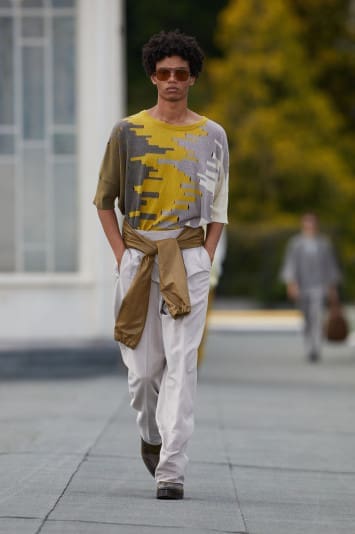Love it or hate it, phygital is looking like the official word of the September shows. Today, the Camera Nazionale della Moda Italiana released its official spring 2021 men’s and women’s calendar, billed as a “phygital fashion week” that will blend 28 physical shows with 24 digital ones.
As we’ve seen during our summer of virtual men’s, resort, and couture collections, a digital show can be almost anything: a documentary on the making of a collection; a music video; a podcast; or even an experiment in virtual and augmented reality. So far, only a few have really resonated; Jonathan Anderson’s “show in a box” and Maison Margiela’s 50-minute film by Nick Knight come to mind. Considering they’ve had more time to prepare, perhaps Milan’s designers will offer something just as strong: Missoni, Marco de Vincenzo, Luisa Beccaria, and DSquared2 are all listed as “digital” on the calendar.

Overwhelmingly, though, most of the city’s news-making brands are moving forward with physical runway shows, among them Marni, Versace, Fendi, Dolce & Gabbana, Max Mara, and Giorgio Armani. A few labels that presented digital collections in June are also on the schedule with physical events, including Prada and Sunnei. All of these events will likely come with a laundry list of restrictions, perhaps following a similar format as Etro’s or Dolce & Gabbana’s shows in Milan in July.
That means it’s also safe to expect a degree of controversy; until there’s a vaccine for COVID-19, staging an event of any kind, particularly for a high-profile luxury label, will risk being perceived as irresponsible or tone-deaf. Many of these shows will take place outside, but designers will have to make other adjustments: Guests may be required to wear masks, but what about the models? And for those who experience most shows virtually, via livestream, how do you communicate a sense of safety and care?
The benefits of a formal, (partly) physical fashion week could outweigh the cons, namely the “halo effect” and attention it brings to young designers. On September 27, the sixth annual Milano Moda Graduate show will offer a stage to students from Italy’s top fashion schools. International designers have historically brought their collections to Milan, too; Shanghai’s Shuting Qiu is on the calendar this season.
Notably absent are Bottega Veneta, Jil Sander, and Moschino, though they may join the calendar in the coming weeks. Gucci is also not on the schedule: Alessandro Michele announced in May that he would trim Gucci’s runway shows from five to two, and the next one will take place “off calendar” in November. Other houses are expected to join Gucci in showing later, signaling that “fashion week” could become an increasingly fluid concept, with designers and brands planning shows around the world when it suits them. That could be a few seasons or years off; until then, Vogue Runway will be covering all the action—real, virtual, phygital—in September, wherever it’s happening.

